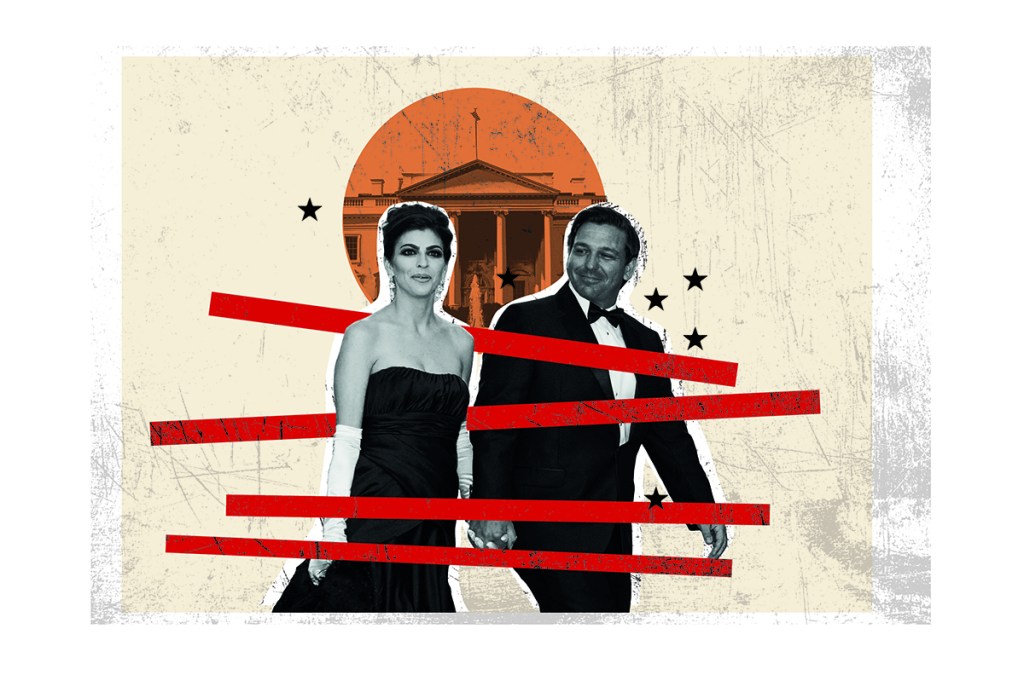The woman with a starring role in perhaps the most talked about campaign ads of both the 2018 and 2022 election cycles wasn’t on the ballot. In both, a politician whose stock has risen as much as anyone’s in the last half decade was happy to let his wife do the talking.
Five years ago, Casey DeSantis narrated a thirty-second clip in which she testified to her husband Ron’s admiration for Donald Trump. You’ve probably seen it. “Everyone knows my husband is endorsed by President Trump, but he’s also an amazing dad. Ron loves playing with the kids,” says Casey. The ad cuts to footage of the Republican gubernatorial candidate building a toy wall with one child, reading The Art of the Deal to another, and so on. “People say he’s all Trump,” says Casey. “But he’s so much more.” It was an amusing clip, one that showed self-awareness, a sense of humor and media savvy. Most importantly, it communicated its message unambiguously.
Four years on, Casey was once again front and center, although this time she struck a very different tone as she explained the support she received from her husband after she was diagnosed with breast cancer a year earlier. “If you want to know who Ron DeSantis really is,” she tells the viewer, sitting cross-legged on a couch, her voice cracking slightly: “When I was diagnosed with cancer and I was facing the battle for my life, he was the dad who took care of my children when I couldn’t. He was there to pick me off of the ground when I literally could not stand. He was there to fight for me when I didn’t have the strength to fight for myself.”
It isn’t just the ads. Whether on screen or off, at the podium or behind the scenes, Casey DeSantis has had an outsized role in her husband’s dizzying rise. To be sure, political careers are often a family affair; spouses are expected to do their fair share of glad-handing and are usually consulted on the big decisions. But Casey takes things further. She is Ron’s closest confidante, sitting at the heart of a tight-knit group of advisors, and an essential part of his public image, lending her husband what an uncanny number of people I spoke to for this article described as a “Kennedyesque” sparkle.
“It’s a mind meld,” says a former staffer. “They come completely as a team,” says a pollster who has worked with DeSantis. According to one newspaper profile of the Florida governor, lawmakers in the state joke that he has just two advisors: Jesus Christ and Casey.
Casey reportedly interviews everyone who works for her husband. It was Casey who suggested they start pronouncing their name “Duh-Santis,” instead of “Dee-Santis,” during the 2018 campaign. It was Casey — a former TV news reporter and host — who pushed her husband to spend more time on Fox News in the early weeks of the pandemic, a move that would help him become a major national figure. It was Casey who introduced her husband on stage when he announced his reelection bid — a step up from the post-speech hug-kiss-and-wave generally expected of spouses. It was Casey who, according to the New York Times, warned her husband against missing his chance to mount a presidential challenge. “You have a moment,” she is reported to have told him. And when it comes to capitalizing on that moment, Casey will be instrumental in deciding how best to go about it.
The forty-two-year-old Casey DeSantis (née Black) brings a blemish-free backstory to a White House bid that now seems inevitable. Casey grew up in Troy, Ohio, where she was a star student and athlete in high school. At the College of Charleston, where she majored in economics, she was part of the equestrian team and runner-up in the Division I NCAA National Championships.
The DeSantis marriage is a very Florida love story. The couple met at a driving range in 2006. At the time, Casey was working at a Jacksonville television station where she would win an Emmy for her on-air work. Ron had recently graduated from Harvard Law School and was serving as a JAG in the Navy. “I kept looking over my shoulder because I wanted the bucket of balls that somebody had left because my swing was so terrible,” Casey said in a 2018 interview. “As I’m looking over behind me, Ron is over there. He thinks I’m looking at him.” Four years later, they were married at a chapel at Disney World, a move that Ron now calls “ironic” given his recent tussle with Disney. You can see Cinderella Castle from the chapel. Ron wore his white Navy uniform and medals. In his new book, The Courage to Be Free, he says the location was Casey’s idea but that he agreed on the condition that “no Disney characters could be part of our wedding… I didn’t want Mickey Mouse or Donald Duck in our wedding photos.”
Casey has been an asset from the start of her husband’s political career. When he ran for Congress for the first time in 2012, then just thirty-four and fighting for an open seat near Jacksonville, more people knew his wife’s name than his. A former aide says she put in long hours during that race: the couple splitting up to knock on as many doors as possible. Then, as now, her political talents were clear, explains the former aide: “She can rev a crowd up, she’s smooth on her feet and can answer questions and talk, and that’s just always been the case.”
That would be a sign of things to come, and when her husband became governor, Casey fashioned herself into a very visible first lady, tackling a longer list of initiatives than she needed to, campaigning more vigorously than was required. She stepped out of the limelight in 2021 after a breast-cancer diagnosis, only to return after the all-clear last year. She has played a high-profile role in the response to Hurricane Ian, leading an effort to raise relief money, and last month unveiled a new cancer-fighting initiative in the state.
In Ron’s presidential campaign, Casey’s various initiatives won’t matter nearly as much as the less tangible ways in which she changes the public perception of her husband. Ron DeSantis surely knows that standing alongside his good-looking wife and three young children is a useful way to present himself to a country tired of boomer candidates and their dysfunctional families.
“It’s not just her,” says the pollster Whit Ayres, who worked on DeSantis’s first governor’s race. “They’re an incredibly telegenic family. They look like the Kennedys from the Camelot era. They are cute and attractive and all-American and wholesome and all those good words you think of when you think of a darling family.”
On both election night and at her husband’s second inauguration as Florida governor in January, Casey looked conspicuously White House-ready. Holding the Bible as her husband was sworn in for a second time, she was dressed in a mint dress and cape with white gloves, an outfit plucked straight out of the Jackie Kennedy look-book.
As well as emphasizing her husband’s youth (Ron DeSantis is forty-four), Casey is also credited with softening his image. That is important given the Florida governor’s reputation for relishing a fight, whether with the media, one of his state’s largest employers or the White House. Humanizing their husbands has been a crucial task for every presidential candidate’s wife, says Kate Andersen Brower, author of First Women: The Grace and Power of America’s Modern First Ladies. “Anything you can do to lighten the mood is important,” she says. “I’m reminded of Laura Bush on the campaign trail, making fun of her husband, and Michelle Obama did this too. Reminding people that they are human is a really important role that first ladies can play.”
Reports of Casey’s input in staffing decisions brings to mind Nancy Reagan, who, as Brower explains, “was effectively her husband’s human-resources department.” Such involvement, she tells me, “is essentially about loyalty”: protecting your husband and deciding “who is out for themselves and who is really going to be there through thick and thin.”
One former staffer says parts of the public perception of Casey’s role are overblown. In particular, the aide says some of the claims about her day-to-day involvement in her husband’s operation are exaggerated. But the former aide nonetheless describes them as a formidable team, and predicts that won’t change if and when DeSantis runs for the top job: “Why would it? They’re so good together.”
Given that Casey’s starring role in both of her husband’s successful gubernatorial bids proved so effective, why change the winning formula in a presidential campaign? One person who seems to appreciate the importance of Casey to the DeSantis operation is Ron’s biggest 2024 rival. According to reporting by Puck’s Tara Palmeri, Trump allies say that the former president has identified her as a target to attack in order to draw Ron into the race. Trump reportedly wants to present her as the power behind the throne and ask questions about how she pays for her clothes, hair and makeup.
Taking a swing at an attractive, media-savvy cancer survivor would be a hazardous course for the former president to take. But such an attack would be far harder to ignore than the absurd “groomer” accusations floated by Trump in February, and it would present the first big test for Ron DeSantis on the long road to the nomination next year. It may be a characteristically low blow from Trump — but it would have a basis, however tenuous, in a truth obvious to anyone who has observed Florida’s first couple in action: that there’s no Ron without Casey.
This article was originally published in The Spectator’s April 2023 World edition.

























